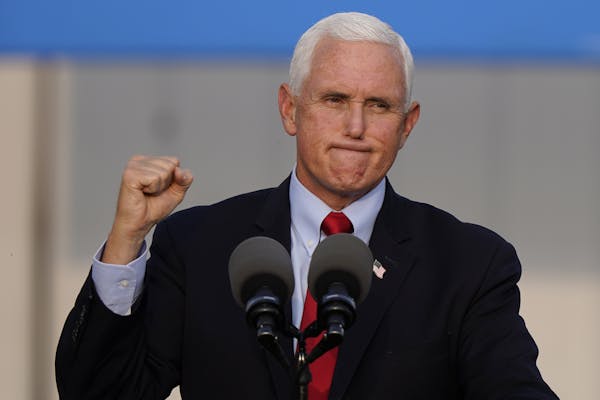Dueling presidential visits to northern Minnesota on Friday are setting up a high-stakes battle for support in a region that's shifted toward Republicans in recent elections and redefined Minnesota politics.
Former Vice President Joe Biden's first trip to Minnesota as a presidential candidate will find him in Duluth for an afternoon tour of a union training center. Roughly 150 miles to the west, President Donald Trump is dropping into Bemidji for a dinnertime rally at the local airport. Both candidates are arriving on the same day the state kicks off early voting, making Minnesotans among the first in the nation to cast ballots in the November election.
While Biden looks to reassert Democratic competitiveness beyond the Twin Cities and its suburbs, Trump is aiming to shore up his backing with the rural voters who have propelled his prospects in a state he narrowly lost four years ago.
With Trump's personal vow to flip Minnesota this year, the state has emerged as an important presidential battleground, confirmed by heavy TV ad buys and frequent campaign visits. Politicos in the state couldn't remember a time when both major-party presidential candidates visited Minnesota on the same day.
Northern Minnesota is pivotal to Trump's goal of carrying the state, something a Republican presidential candidate hasn't done since 1972. The white, working-class voters who have been an essential part of Trump's coalition are especially prevalent in the state's northern latitudes, and their shift toward Republican candidates in recent elections has upended Democratic expectations in an area that is still home to many union households.
"The president stood up for the Iron Range, and miners on the Iron Range," said U.S. Rep. Pete Stauber, the first-term Republican from northeastern Minnesota's Eighth Congressional District. While acknowledging the pandemic's toll, Stauber said Trump is the candidate best suited to revive regional fortunes: "The president through his pro-growth and pro-jobs policies is going to give this economy a shot in the arm."
Trump carried Stauber's district by 15 percentage points over Democrat Hillary Clinton in 2016. He did even better in the neighboring Seventh Congressional District covering western Minnesota, where he won by more than 30 points. That includes Bemidji, where Trump will land in the afternoon,
DFLers don't necessarily expect to win back those rural districts this year, but many think Biden can at least stanch the losses.
"Biden is popular in northeastern Minnesota," said Jeff Anderson, a Duluth-based DFL strategist who worked for former Rep. Rick Nolan, the last Democrat to carry the Eighth District. Anderson cited Biden's "roots in both Pennsylvania and Delaware, coming from a blue collar family … the work he's done in the Senate really endears him to working class men and women."
Anderson noted Nolan's 2016 win got an assist from Biden shortly before the election. Nolan did not run again in 2018, which cleared the way for Stauber. Though he's a first-termer in a historically Democratic district, Stauber is widely seen as on his way to a comfortable re-election.
Minnesota Democrats have some reason to be confident, if not overly so. While a batch of midsummer polls suggested a potentially tight race across the state, Biden in three different polls in the past week was leading Trump by 9 points or more.
"If Biden can narrow the Trump campaign's margin in the Eighth District, that's going to really undercut Trump's ability to run up the score and overcome … a big deficit in the metro," said Jeremy Drucker, a Minneapolis-based DFL strategist.
Minnesota Republican Party Chairwoman Jennifer Carnahan dismissed the most recent polls, though Republicans touted earlier polls that showed Trump tied or within striking distance. "The polls were grossly off four years ago," Carnahan said. She suggested that Trump is doing at least two to four points better than recent polls suggest. "Having him come on the first day of early voting, I know his message will be rallying the troops."
Both candidates have taken to the Minnesota airwaves. A new Biden ad headed for a handful of battleground states features a Pennsylvania voter who previously supported Barack Obama, switched to Trump four years ago but has now swung back. A Trump ad showing in Minnesota and other states focuses on the economy and hits back at Biden.
Still, Advertising Analytics, a Virginia-based firm that tracks campaign spending on ads, found that the Trump campaign reduced its TV spending for a handful of Midwestern states, including Minnesota.
Biden's persistent edge in swing-state and national polls is a big reason why Minnesota is getting so much attention this year. Trump's loss here in 2016 was one of the closest of any state Clinton carried, and with Biden ahead of Trump in polls of several states the president carried four years ago, a state like Minnesota is a key part of the equation if Trump is to eke out an Electoral College win.
For Trump to win Minnesota, "It would have to be a perfect storm, and I think it could be," said Cindy Rugeley, a political-science professor at the University of Minnesota in Duluth. "He will have to hit that 16 percentage points or more in [the Eighth District] and all the rural districts. He's going to have to hold at least as many votes as he got in the suburbs."
Vin Weber, a former GOP congressman from Minnesota and a longtime D.C. lobbyist, questioned why Trump would campaign in Bemidji given his already presumed rural and small-town advantage.
"He's got to break through in the suburbs in ways that aren't apparent to me yet," Weber said. "In view of the polling I've seen, though I'm happy they're coming to northern Minnesota, I'm not sure why."
Patrick Condon • 612-673-4413
Briana Bierschbach • 651-925-5042

Officer in group who killed George Floyd finishes federal prison time, not free yet

Lacrosse lists: 21 top players and the school that's No. 1 for boys and girls

Rep. Ilhan Omar's daughter suspended from college for involvement in pro-Palestinian protests

